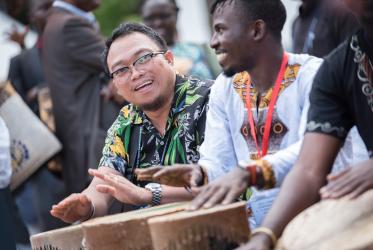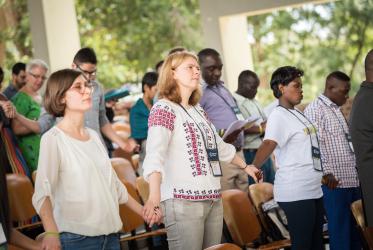The online gathering brought together more than 25 representatives from WCC member churches and partners from all over the world.
The commission—in collaboration with member churches, other churches, ecumenical partners, academic institutions, and networks—aims to foster the understanding and practice of ecumenical learning.
The commission also supports the churches' ministry of ecumenical education and formation within the Christian community and the world; and promotes ecumenical theological education and ministerial formation, helping churches and their congregations to be inclusive learning communities.
During the meeting, commissioners introduced themselves and heard about the work of the WCC related to education and formation, including within the Ecumenical Institute at Bossey, to form ecumenical leaders, both clergy and lay, for service in parishes, classrooms, and ecumenical centres around the world.
Commission moderator Rev. Dr Meehyun Chung, from South Korea, expressed hope in the vision of the commission, particularly in a world facing grave challenges.
“I hope we can work together to promote peace and a life-centred theology in this death-oriented era,” she said. “I wish you all fruitful work. We need your help, support, and your good insights.”
She added that the commissioners shared and exchanged inspiring ideas and constructive examples in order to reach their common goals. "I feel our commission is very diverse in terms of region, denomination, age, gender, and so on,” she said. “Thus, I am expecting a fruitful outcome if we work and cooperate through our rich resources. I appreciate their willingness to rebuild trust and tolerance in this wounded world.”
The commissioners also created working groups to oversee and nurture programmes such as the Global Ecumenical Theological Institute, and others.
WCC programme director for Unity, Mission, and Ecumenical Formation, Rev. Dr Kuzipa Nalwamba, noted that the WCC’s 2023-2030 strategic plan states the priority for ecumenical formation as “formation as ethos and as programme.”
“It places an accent on the duo nature of ecumenical formation as lifelong learning in its orientation and as institutional in form in the Ecumenical Theological Education programme and Ecumenical Institute at Bossey,” she said. “The Commission on Education and Ecumenical Formation will accompany the staff to realise outcomes that hold both aspects in a healthy tension.”
The next meeting of the Commission on Education and Ecumenical Formation will be held in person at the Yonsei University, Seoul, Republic of Korea, in June 2024.








